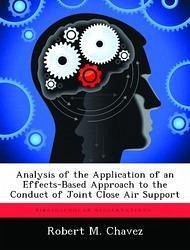Recent joint force thinking has espoused effects-based operations (EBO) as an evolutionary, some say revolutionary, approach to warfare. The 2003 Joint Operations Concepts document states, "The Joint Force uses an effects-based approach." With this in mind the primary question is, Can an effects-based approach to the conduct of joint close air support (CAS) improve achievement of the supported ground commander's intent? EBO history and theory are explored as well as the current state of joint CAS doctrine, demonstrating that EBO is conceptually well documented but effects-based ideas are just recently beginning to appear in joint publications. Current CAS doctrine presents the objective-based approach to warfare prevalent in most joint and service publications. Due to the lack of historical examples of effects-based CAS operations, the thesis uses a qualitative comparison of objective- and effects-based CAS to analyze the primary question. The analysis reveals an effects-based approach can improve achievement of the supported ground commander's intent to some degree over the current approach and suggests that EBO is an evolutionary development of objective-based operations that should be formally incorporated into the conduct of joint CAS.








